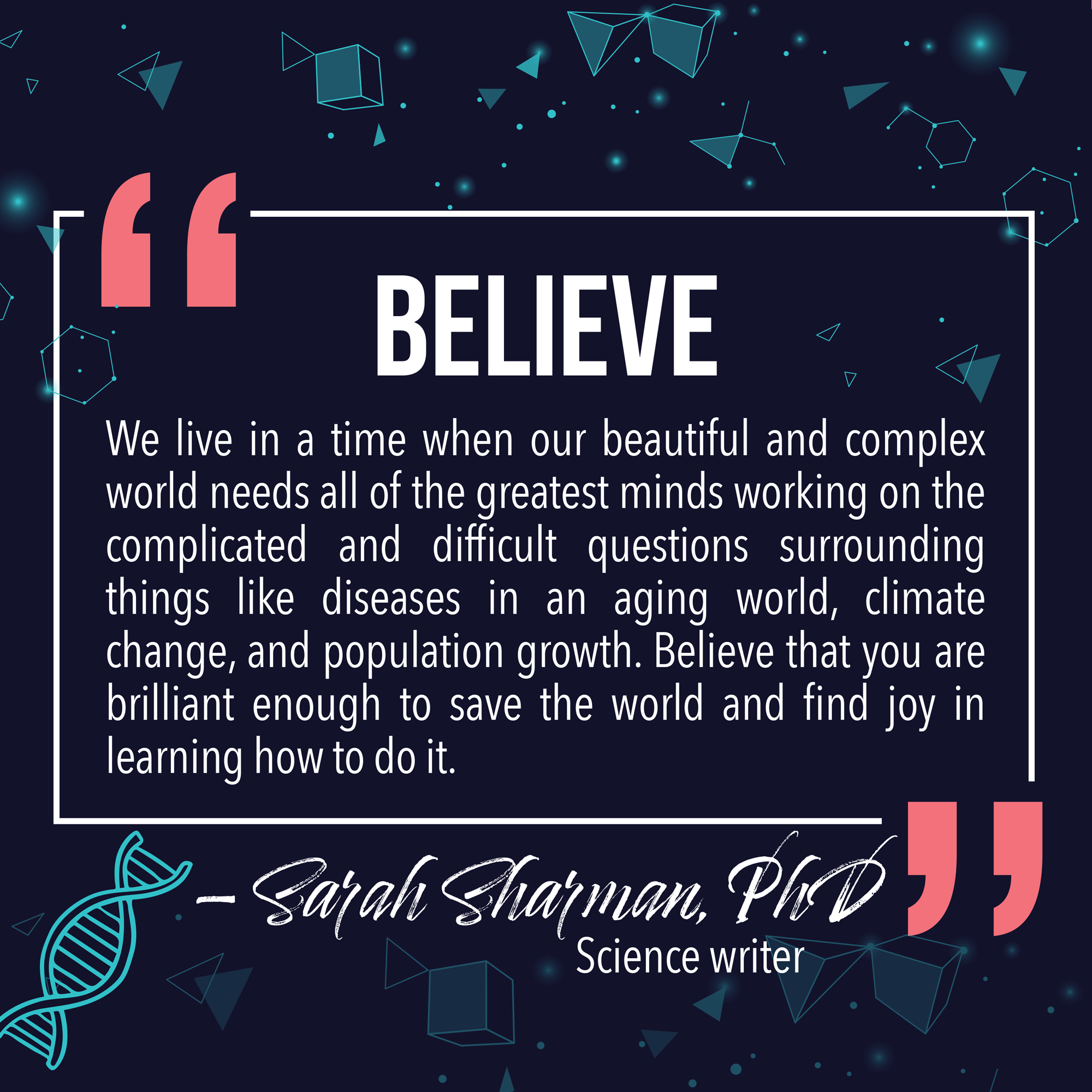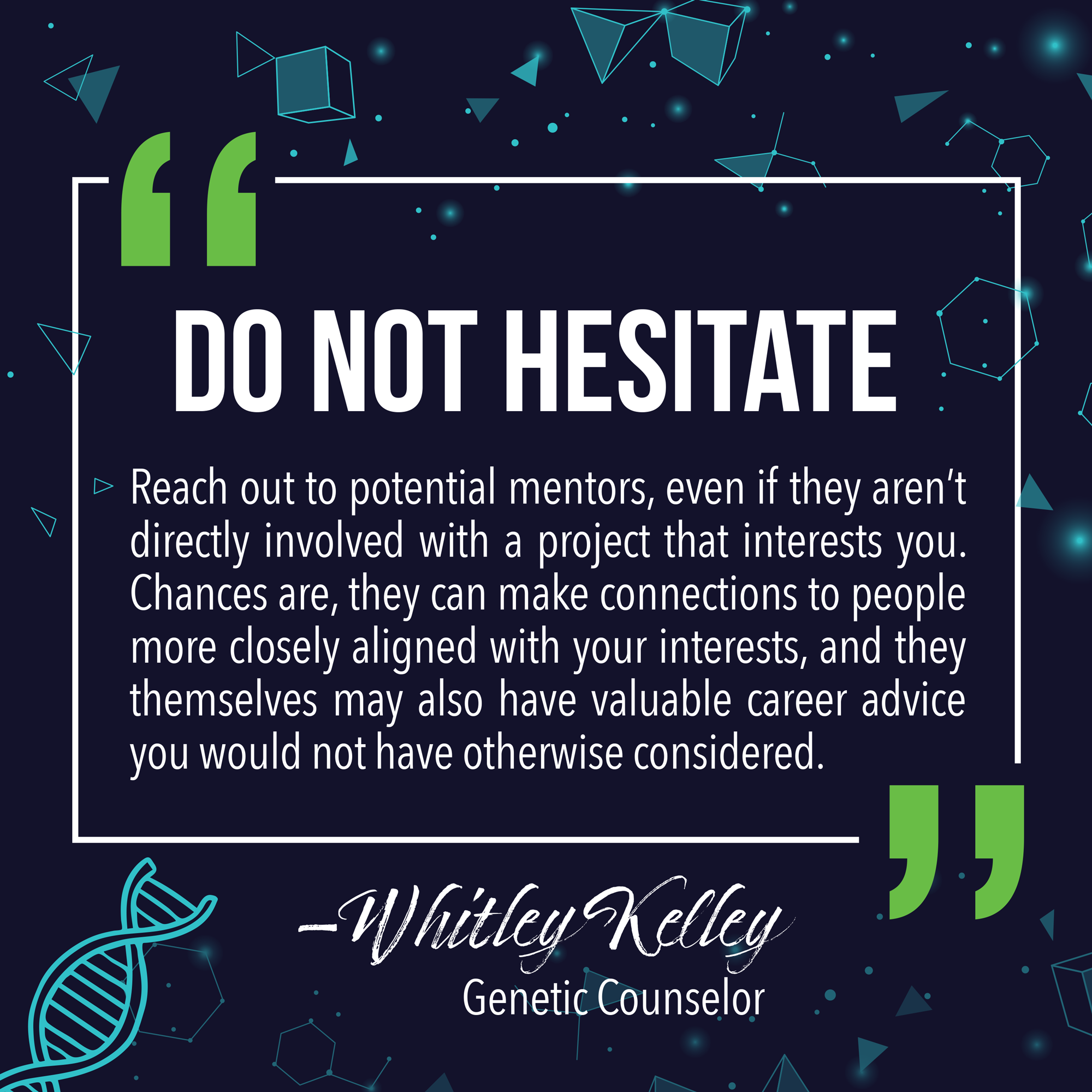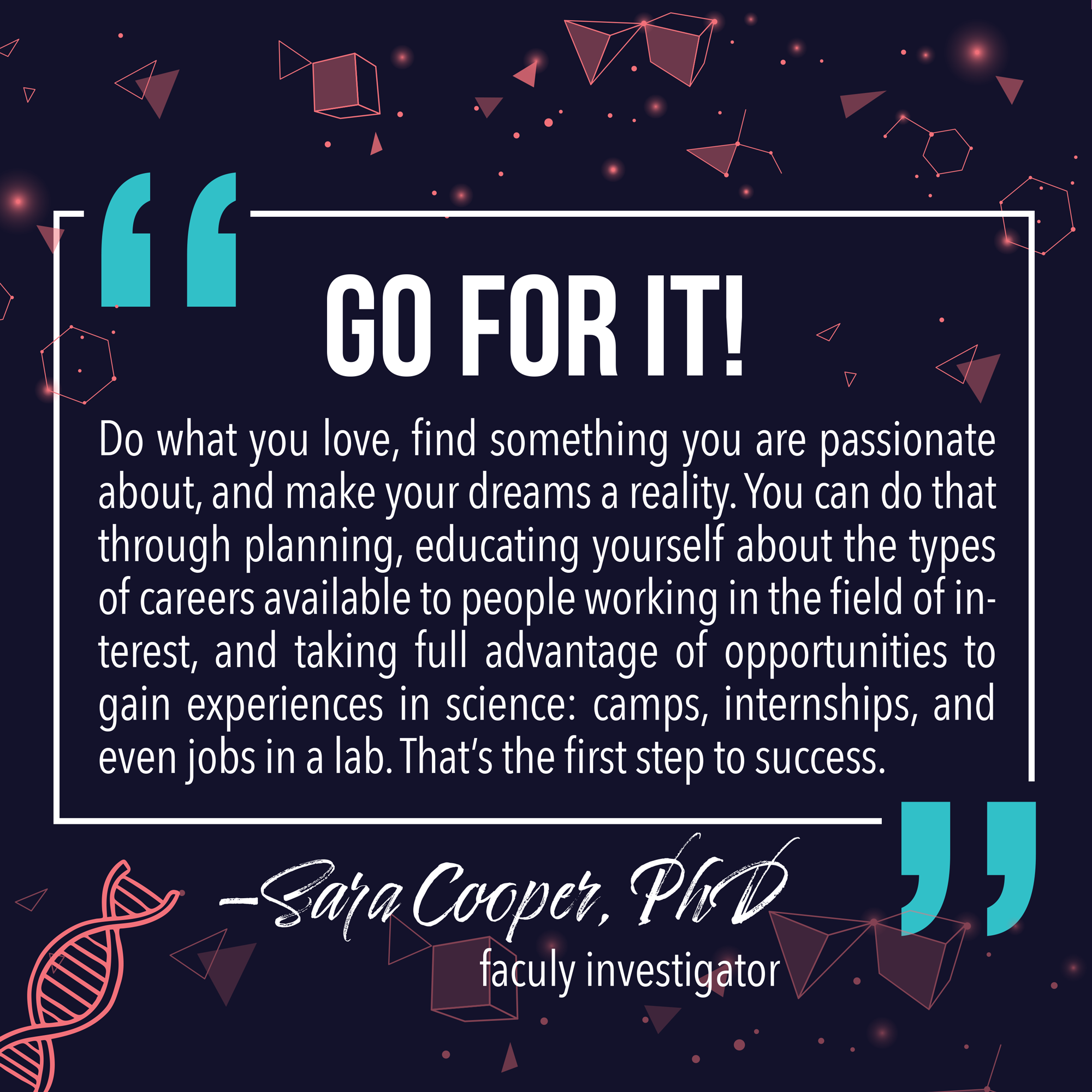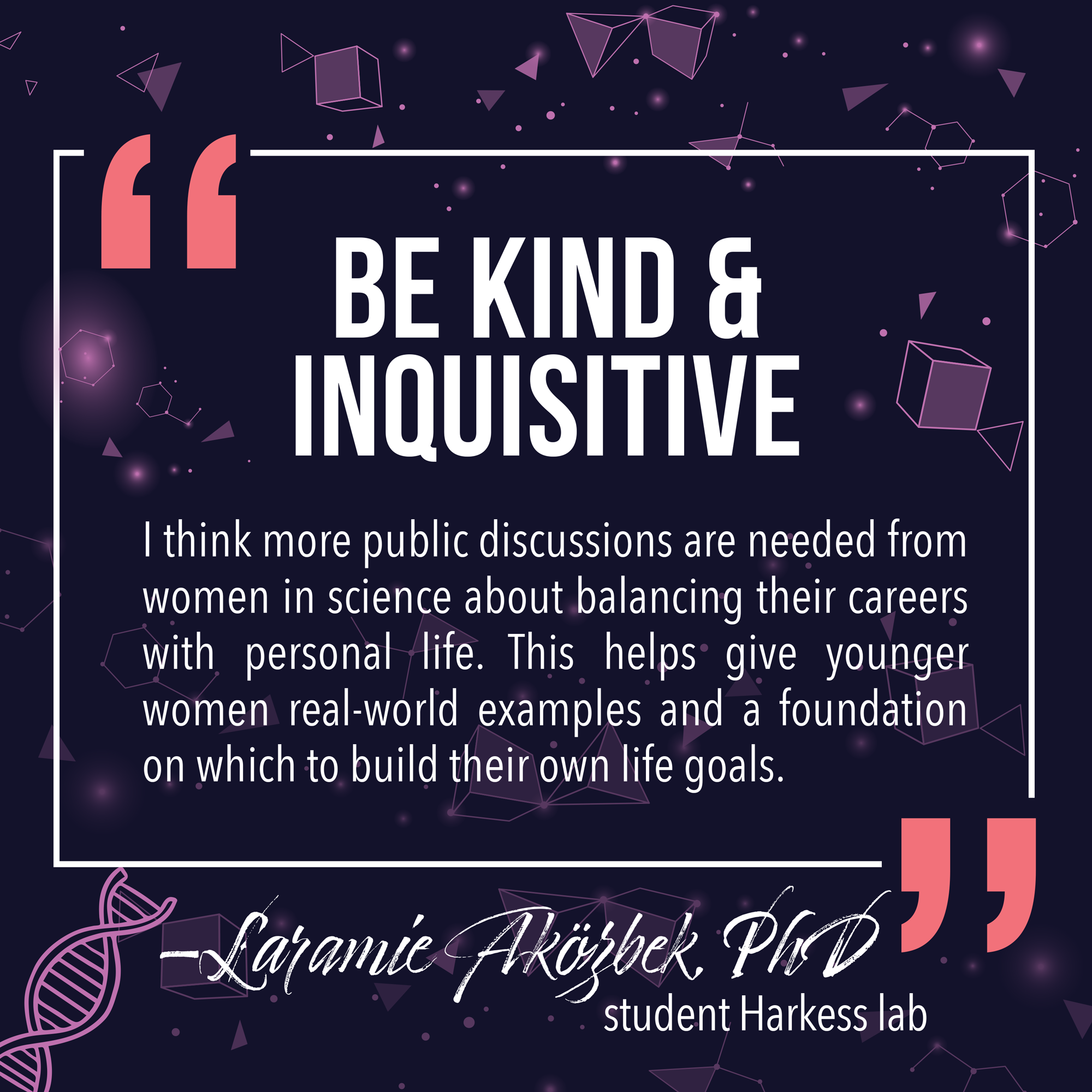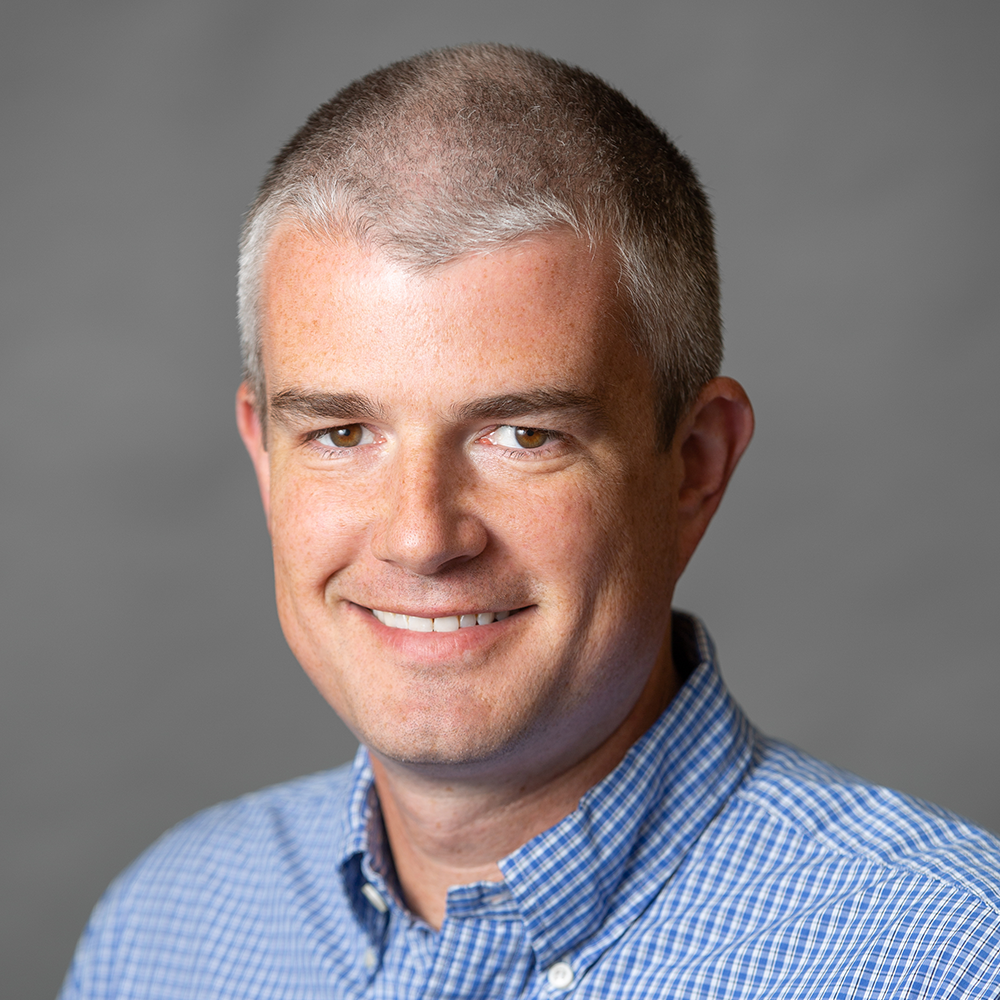
Celebrating International Day of Girls and Women in Science
By: Sarah Sharman, PhD, Science writer
Close your eyes and picture a scientist. Fifty years ago, we might have all pictured a man in a lab coat carefully pipetting liquid from one tube into another with a lab full of other male scientists bustling around in the background. As technology has advanced and the field of science has become more inclusive, that image probably doesn’t look as uniform as it once did. Now you may imagine a woman sitting at a computer performing analysis on a viral genome. Or a group of young students digitally cataloging plants in their neighborhood as part of a citizen science project.
I am usually just the woman behind the words, bringing you all of the amazing scientific research and technological advances coming out of the labs and companies at the HudsonAlpha Institute for Biotechnology. But today, in honor of International Day of Girls and Women in Science, I would like to step out from behind that veil and join a few other women at HudsonAlpha to tell you about our journeys through the wonderful world of science. We hope our stories and advice inspire and encourage the next generation of female scientists, engineers, and mathematicians.
‘When I grow up, I want to be…’
 I grew up in the 1990s and early 2000s during a time when more women than ever were breaking into the workforce and demanding equal representation and pay. By the end of the 1990s, 60 percent of women had entered the workforce. This energy spilled over into my everyday life, providing me with my fair share of intelligent, outspoken girls and women to look up to.
I grew up in the 1990s and early 2000s during a time when more women than ever were breaking into the workforce and demanding equal representation and pay. By the end of the 1990s, 60 percent of women had entered the workforce. This energy spilled over into my everyday life, providing me with my fair share of intelligent, outspoken girls and women to look up to.
In grade school, we were taught about strong women throughout history like Madam C.J. Walker, Sandra Day O’Connor, and Sally Ride who broke into male-dominated fields. They all had one thing in common: they fearlessly challenged society when they were told they could not do something or did not belong somewhere. Even as a child, I knew that in order to be a bold, trailblazing woman I needed to emulate these role models. I was lucky to have teachers from grade school through high school that supported me and told me that I could do great things.
Many of the other women at HudsonAlpha that I have talked to share a similar appreciation and gratitude to the teachers that inspired and believed in them. Several women, like project manager Courtney Valerio and genetic counselor Whitley Kelley, even acknowledge these shepherds of early education influenced their decision to work in science. Whitley said that her teachers engaged and challenged her, allowing her to be curious about science for the sake of curiosity, as opposed to just memorizing information to obtain a particular grade in class.
For others, like research associate Amy Beth Brown, inspiration was found a little bit closer to home. Amy’s engineer mom is the one who helped spark her love of science. “My mom had me apply to engineering camps for three summers,” says Amy. “These camps promoted women and minorities in STEM, and I was never told that I was unable to do something or was not enough. Having this confidence from an early age allowed me to remain confident in my abilities in and out of the lab environment.”
Curiouser and curiouser: journeying into science
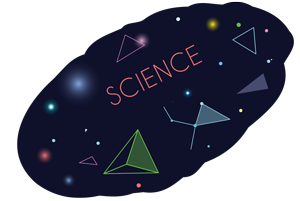 Bill Nye, Ms. Frizzle and her adventurous students, and Jimmy Neutron, the boy genius are part of my first memories of realizing how cool the curiosities of our wide world truly are. These educational children’s programs were definitely entertaining but they also taught me to ask questions and explore the world around me.
Bill Nye, Ms. Frizzle and her adventurous students, and Jimmy Neutron, the boy genius are part of my first memories of realizing how cool the curiosities of our wide world truly are. These educational children’s programs were definitely entertaining but they also taught me to ask questions and explore the world around me.
Many women in STEM (science, technology, engineering, and mathematics) describe their love for their field as being seeded in an insatiable curiosity and desire to understand the ‘whys’ and ‘hows’ of our world. Postdoctoral fellow Sarah Carey, PhD, echoed this sentiment perfectly stating, “My literal job is to seek out and explore new things in the plant world every day. I can’t think of anything cooler I could be doing.”
Although I knew that being a scientist was a career option, I did not realize that being a scientist was my career choice until the end of my time at undergraduate school. I was a biology major who thought she was going to go to medical school. It wasn’t until I was doing mandatory senior research that I developed a true passion for scientific research and discovery. It still blows my mind that my little research project using yeast to study cellular responses to chemotherapy would spark my lifelong love of biology and cancer research and convince me to pursue a doctoral degree.
For graduate student Laramie Aközbek, her road to science was a little bit windier. She came to science from a humanities background after taking some time off from college. Laramie was inspired to change her course of study by working in her family’s greenhouse. 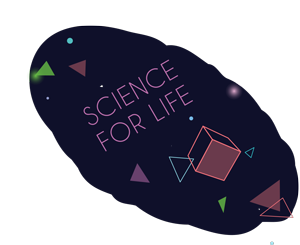
“I took some time off from college to work and, in the evenings, spent time in my family’s greenhouse propagating plants and tending to them, something I grew up doing alongside my mother,” she says. “So many late nights alone spent in deep thought about these organisms made me want to understand them better. I applied to the University of Georgia to study them.”
When your biggest hurdle is your own confidence
For a long time, science was considered a man’s field. Although this has changed in many parts of the world, it does not mean that the shadow of the ‘old boys’ club’ doesn’t still linger over female scientists. Oftentimes, breaking into the field isn’t the hardest part of the journey, rather it is having the confidence to accept that you belong there.
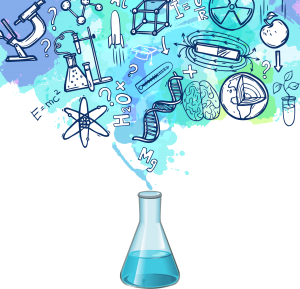 Courtney Valerio began her career straight out of college and felt that due to her age and gender she was not taken as seriously as her male counterparts.
Courtney Valerio began her career straight out of college and felt that due to her age and gender she was not taken as seriously as her male counterparts.
“The biggest obstacle I have had to overcome is believing in myself and gaining confidence,” says Courtney. “It was not an easy field to fit into right out of college and despite being intelligent and receiving all the same training I constantly was proving myself and my ideas to other people.”
Sharing a similar sentiment, Laramie Aközbek says, “The greatest obstacle has always been my own mind: to be fearless and to be consistent.”
For me, having female mentors and strong relationships with other females in the field gave me a network of women to reach out to for advice or lend an ear when issues like lack of confidence arose. It is important that girls and young women starting out in science know that they have a support system from other women who have been through similar struggles and victories.
“I firmly believe in mentoring, making connections, and sharing life and career experiences to help the next group of women coming in,” says Courtney. “I think just having a network of women to reach out to for advice would make the field more attractive. For anyone, it’s scary navigating the unknown but we are a diverse group of women, incredibly smart, and I think it would benefit those already in the field as well to have experiences that remind them of that.”
We’ve come a long way but there is still work to be done
Despite making up nearly half of the U.S. workforce, women are still underrepresented in STEM fields. According to the U.S. Census Bureau, women only represent 27 percent of STEM workers. The gender gap is especially high in the engineering and computer science fields, which represent some of the fastest-growing and highest-paying jobs of the future. In other fields like the biological sciences, women represent the majority at some levels like medical and graduate school but the bias towards men remains striking at higher levels like tenured or full professor.
Women who do enter into STEM fields often experience inequities that interfere with their ability to climb the ranks and have a successful career. Several studies have shown that women are typically given smaller research grants and institutional start-up funds than their male colleagues. Female researchers tend to have shorter, less well-paid careers. Their work is underrepresented in high-profile journals, even if they were the person performing or conceptualizing the experiments. These trends are frustrating at the very least but can also stall or end women’s careers.
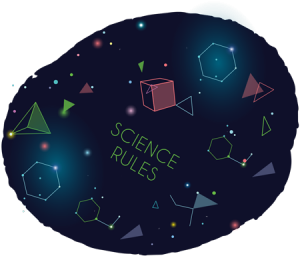 There have been numerous studies that shed light on the effects of gender stereotypes and gender bias in STEM fields. One study found that scientists were more likely to choose a male candidate over an identical female candidate for a hypothetical job opening, while another showed that both male and female scientists offered a higher salary to a male candidate.
There have been numerous studies that shed light on the effects of gender stereotypes and gender bias in STEM fields. One study found that scientists were more likely to choose a male candidate over an identical female candidate for a hypothetical job opening, while another showed that both male and female scientists offered a higher salary to a male candidate.
Gender stereotypes can also affect how we as women view ourselves in the workplace. Growing up I somehow knew that science and math were more “male-oriented” subjects, while literature and English were associated with women. Thankfully, I had an amazing gifted resource teacher who not only treated the girls and boys in my class equally, but she let us dream big about what we wanted to do when we entered the workforce.
I asked some of my female colleagues at HudsonAlpha what needs to change in the science field to attract young women to the field and also retain them for longer. Some of their answers are reflected below.
“I think more public discussions are needed from women in science about balancing their careers with personal life. This helps give younger women real-world examples and a foundation on which to build their own life goals.” Laramie Aközbek
“More formal mentorship programs for students and early career professionals, better paid family leave in academia, and more flexible working arrangements would all make the field more attractive to and help retain women.” Whitley Kelley
“I have trained under and worked for understanding and compassionate people who care about me as a person, in addition to caring about me as a scientist. I think some places do this well, and others could improve on how their systems adjust to the needs of people whose plans have changed during the course of their careers. I think a culture shift that is flexible and compassionate is needed to keep women in science.” Sara Cooper
“I believe that both male and female advocates need to be present in all aspects of science. Positions should be earned, but no person should be considered lesser than another because of their gender. Men should be made aware of the struggles women face in the workplace and help look for and enforce solutions that make the work environment a better place for all workers.” Amy Beth Brown
“Equal pay for all genders and better access to childcare for working parents.” Sarah Carey
Advice for the future girls and women in science
Meet the Women Featured in this Article
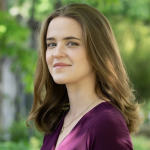
Laramie Aközbek- PhD student in the Harkess lab
Laramie received a Bachelor of Science in plant biology from the University of Georgia. She is working towards her PhD at Auburn University in the Department of Crop, Soil, and Environmental Science.
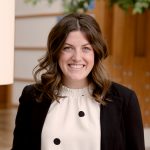
Amy Beth Brown- Research Associate in the Cochran lab
Amy received a Bachelor of Science in Microbiology from Mississippi State University.
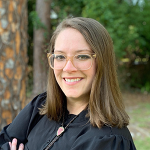
Sarah Carey, PhD- Postdoctoral Fellow in the Harkess lab
Sarah received a BS in biology and a PhD in botany, both from the University of Florida. She is currently a USDA-NIFA fellow at Auburn University in the Department of Crop, Soil, and Environmental Science doing her research in the Harkess Lab at HudsonAlpha.
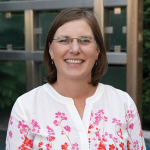
Sara Cooper, PhD- Faculty Investigator
Sara received a Bachelor of Science in genetics from the University of Wisconsin-Madison and a PhD in genetics from Stanford University. Cooper joined HudsonAlpha in 2010 after completing postdoctoral work at the University of Washington in Seattle.
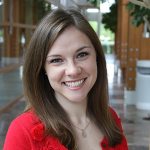
Whitley Kelley, CGC – Genetic Counselor
Whitley received a Bachelor of Science in Cell and Molecular Biology from Auburn University and a Master of Science in Genetic Counseling from the University of Alabama at Birmingham. She is a genetic counselor for the Institute’s pediatric genomics research projects and The Smith Family Clinic for Genomic Medicine.
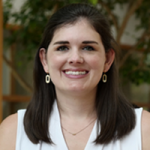
Sarah Sharman, PhD – Science writer
Sarah received a Bachelor of Science in Biology and Psychology from Birmingham-Southern College and a PhD in Biochemistry and Cancer Biology from the Medical College of Georgia at Augusta University.
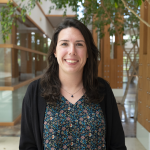
Courtney Valerio- Project Manager in the Clevenger lab
Courtney received a Bachelor of Science in Biology from the University of Mary Washington. She came to HudsonAlpha from the FBI’s Terrorist Explosive Device Analytical Center’s Trace Evidence group as a Trace Evidence Forensic Examiner.


